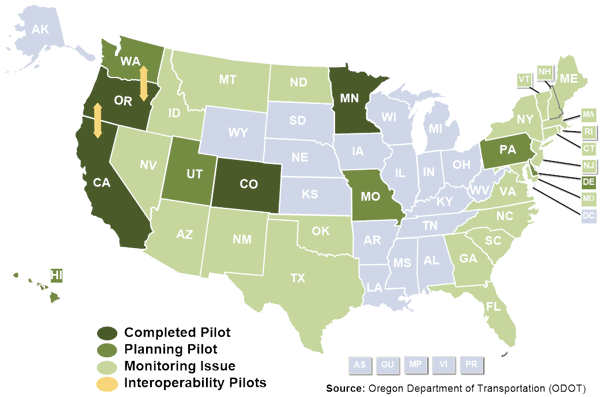An Open Letter to the SANDAG Board of Directors
November 17, 2021
SANDAG Board of Directors
401 B Street
San Diego, CA 92101
RE: Road Use Charges
Dear Chair Blakespear and SANDAG Board Members:
Recently there has been some public discussion of a proposed Road Use Charge (RUC), also known as a Vehicle Miles Traveled Fee (VMTF) included in the funding discussion in the current draft of the Regional Plan. The undersigned members of the Quality of Life Coalition support the concept of a Road Use Charge as part of a funding solution for transportation projects. We believe that a revised RUC would be more effective and equitable than current approaches to transportation funding, as explained below.
First, it is important to acknowledge that we already have a road use charge, known as the gas tax. There are both state and federal excise taxes included in the price we pay for gasoline and diesel fuel. These taxes have been in place for many years. Originally, they covered much of the cost of building and maintaining roads. However, because they were defined as cents per gallon, they failed to keep pace with inflation, and their real value has been steadily declining. They now cover only about one third of the costs of building and maintaining our road network. The rest of the cost must be taken from other tax revenue such as income, property, and sales taxes.
When the gas tax was first imposed, it was a reasonable approximation of road use. People who drove more, or who drove heavier vehicles, paid more. As fuel economy started to improve after the oil price shocks of the 1970’s, the gas tax became less equitable as drivers of newer, more efficient cars paid less, and drivers of less efficient cars paid more.
That gradual decline in both equity and effectiveness was accelerated by the introduction of hybrid cars, which saw huge gains in fuel efficiency, and finally completely upended by the introduction of all-electric cars. Drivers of plug-in battery electric cars pay no gas tax at all, although they continue to contribute to wear and tear of the road network.
The current system is patently unfair and unsustainable. Roads are expensive and must be maintained. Gas tax revenue will continue to decline toward insignificance, even as the cost of maintaining our highway network continues to rise. Drivers of older internal combustion engine (ICE) cars will be paying a larger and larger share of the costs.
Transportation planners at the Federal Government and many states, including California, are looking at potential ways to implement an equitable revenue stream to replace the current falling gas taxes. It is clear that some other form of Road Use Charge will need to be implemented to replace the current Gas Tax RUC.
Various approaches are under consideration, but there is not currently a detailed proposal to replace the existing system. Opponents are citing various “issues” based on speculation about what a system might look like. We believe that it is more important to identify the characteristics that would be desirable in a replacement for the current RUC.
Here are some suggestions about what a replacement RUC should do:
Equity
Low-income drivers tend to drive older, less fuel-efficient cars, and therefore pay for a disproportionate amount of road maintenance and repair. On the other hand, EVs are expensive and inaccessible for many, and will be accessed first by higher-income drivers, who will avoid paying for road maintenance and repair under the current gas tax system.
The RUC should cover a substantial fraction, but not all, of the costs. Everyone benefits from having a network of roads, including people who never drive on them, so some of the cost should be covered by general revenue.
The RUC implementation should allow for adjustments for a variety of factors to ensure fairness.
All road users should pay their fair share of the costs. The RUC should be based on the number of miles driven, and not how the vehicle is powered. Heavier vehicles cause more road wear and damage, so they should pay more.
Local Control
A portion of the RUC should be collected and disbursed locally, not at the whim of politicians in Sacramento or DC. SANDAG is best positioned to collect and distribute local RUC proceeds because they are governed by the Board members, who are accountable to the voters.
For More Information
As you may know, California has conducted a pilot project to learn more about Road Use Charges. Participants:
- Drove more than 37 million miles,
- 73 percent felt that road charging was more equitable than a gas tax,
- 87 percent of participants found the pilot to be easy,
- 85 percent were overall satisfied with the pilot, and,
- 91 percent expressed willingness to participate in another road charge pilot.
Much more information about the pilot program is contained in the final report at:
https://dot.ca.gov/-/media/dot-media/programs/road-charge/documents/rcpp-final-report-a11y.pdf
Caltrans has a web site with information on road use charges at https://caroadcharge.com/about
The Pew Trust reported in September on a new expansion of the pilot program at:
https://www.pewtrusts.org/en/research-and-analysis/blogs/stateline/2021/09/28/california-expands-road-mileage-tax-pilot-program
For more detailed analysis on Road Use Charges, please see the Information and Technology Innovation Foundation’s policy makers guide on Road Use Charges. (https://itif.org/publications/2019/04/22/policymakers-guide-road-user-charges) It concludes with:
“Road user charges are the most viable and sustainable long-term ‘user pay’ option for the federal government to both raise adequate and appropriate revenues and provide the federal share of funding for the nation’s surface transportation system.”
David Grubb, Transportation Chair, Sierra Club San Diego
Pam Heatherington, Board Member, The Environmental Center of San Diego
Bee Mittermiller, Transportation Co-Chair, San Diego 350
Steven Gelb, Transportation Co-Chair, San Diego 350
William Rhatigan, Advocacy Manager, San Diego County Bicycle Coalition
Noah Harris, Transportation Policy Advocate, Climate Action Campaign

Recent Comments